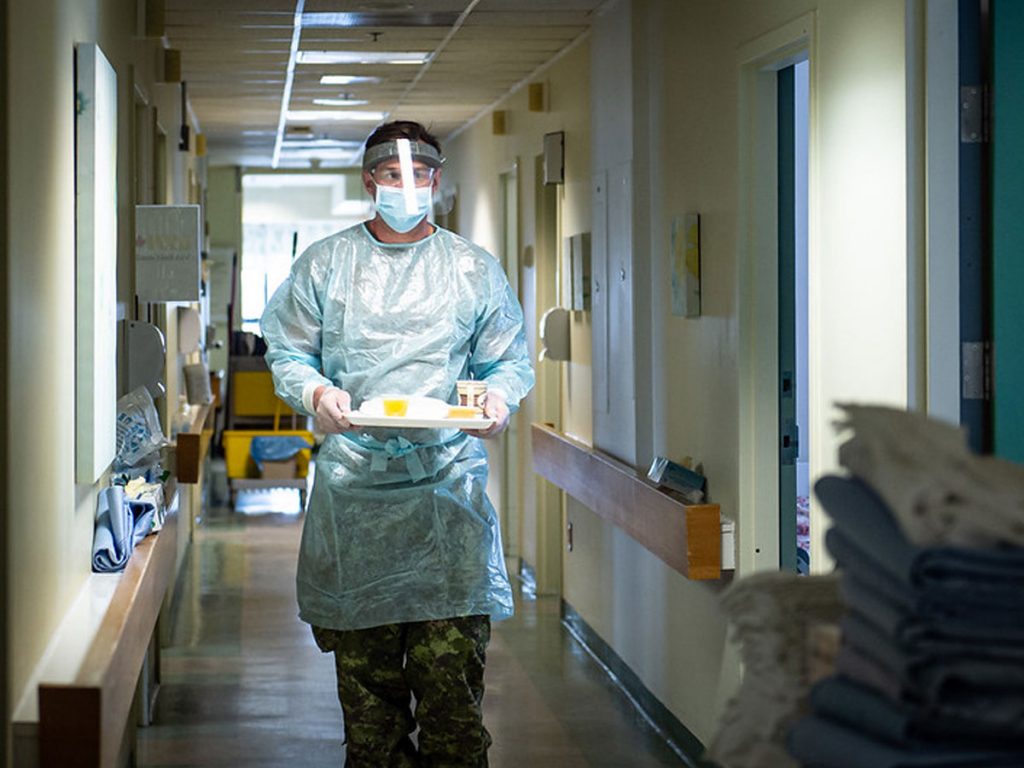To help combat COVID-19, the Canadian Armed Forces (CAF) has been working with partners across Canada during this unprecedented time. To date they have responded to requests from Ontario, Quebec and other areas to help care for seniors and other vulnerable people in long term care facilities.
“The entire Defence Team has been working hard to support the requests from Ontario and Quebec. To confront the peak of the COVID-19 pandemic, Canadians can be assured that the CAF will provide immediate support to health care workers and some of our most vulnerable populations within these facilities,” said Harjit S.Sajjan, Minister of National Defence. “Our country is going through difficult times during an unprecedented health crisis, and I want to salute the efforts of our troops as well as that of all frontline workers dedicated to ensuring the safety of their fellow Canadians.”
Since the latter half of April, they have been supporting civilian authorities in Quebec and Ontario by deploying members to long term care facilities. By working collaboratively with provincial partners and medical staff in the homes they were able to maintain staffing levels and help with infection control and prevention. Some of the work includes providing assistance with the day-to-day operations, the coordination and provision of medical care, and providing general support at the identified facilities.
Following a request for assistance from Quebec, the CAF deployed members on April 20th to five long-term care facilities which was later expanded to other facilities. Currently, there are over 1,020 personnel committed to the support of 20 long-term care facilities in Quebec. Over the next coming days, an additional deployment will be made to support Quebec’s most vulnerable residents.
The CAF is currently serving in the following facilities in Quebec:
· Grace Dart Extended Care Centre (Montreal),
· CHSLD Vigi Reine-Elizabeth (Montreal),
· Résidence Berthiaume-Du Tremblay (Montreal),
· CHSLD Vigi Mont-Royal (Ville Mont-Royal),
· CHSLD Floralies-De-Lasalle (Lasalle),
· Centre d’hébergement de Saint-Laurent (Saint-Laurent),
· CHSLD Argyle (Saint-Lambert),
· CHSLD Benjamin-Victor-Rousselot (Montreal),
· Manoir de Verdun (Montreal),
· Centre d’hébergement Yvon-Brunet (Montreal),
· CHSLD Hôpital Sainte-Anne (Sainte-Anne-de-Bellevue),
· CHSLD Valéo (Saint-Lambert),
· CHSLD Villa Val des Arbres (Laval),
· CHSLD Auclair
· CHSLD de la Rive
· CHSLD Eloria-Lepage (Montréal)
· Centre d’Hébergement Jean-De-La-Lande (Montréal)
· Centre d’Hébergement Saint-Andrew (Montréal)
· CHSLD Denis-Benjamin Viger (L’île-Bizard)
· Le Bellagio (Longueuil)
In a response to a request from Ontario, the CAF has been helping five long term care facilities across the Greater Toronto Area by providing about 265 medical and support personnel.
These members are serving in:
· Orchard Villa (Pickering),
· Altamont Care Community (Scarborough),
· Eatonville (Etobicoke),
· Hawthorne Place (North York), and
· Holland Christian Homes Grace Manor (Brampton)
Due to COVID-19, about 1,200 Rangers are employed throughout many communities across Canada. The Canadian Rangers are deployed to Nunavik, Côte-Nord and Basse-Côte-Nord in Quebec to support these remote communities in their fight against COVID-19. In Northern Saskatchewan, they are providing logistical support and assisting in staffing municipal/community-operated command posts and emergency centres.
In British Columbia’s Haida Gwaii archipelago, in Yukon, in the Northwest Territories and in Nunavut, the Canadian Rangers are providing logistical support including wellness checks; gathering data and statistics on the current state of the community relative to the COVID-19 relief efforts and delivering critical goods to people in need including groceries and prescription medications.
“We know many Canadians are worried about their loved ones in these facilities. They are concerned about the health and the added stress of the isolation that our parents and grandparents are experiencing. It is why when the women and men of the Canadian Armed Forces are called to serve, they do so,” said Minister Sajjan.
